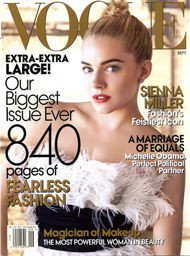Notes on Blogging Aesthetics X

One might call "poetic" (without value judgment) any discourse in which the word leads the idea.
--Roland Barthes
What might we learn from the Vogue Sept. edition-- aka, the "fall fashion week issue"-- still available on your local newsstands? Perusing it this week, I was reminded again of the fashion magazine's unique ability to reverse the usual relationship between content and advertisement: here, it is the articles that seem like the interruption of the primary narrative of the ads, all that text something we just have to sit through or skip over in order to return to the elaborate, unfolding bliss on the other pages. Replace "word" with "image" in the Barthes quote above, and you have the logic of this text. That's not to say there aren't good articles in the magazine, including this month's interviews with Sienna Miller and Michelle Obama (it's meant to be a joke in the fascinatingly conflicted film version of The Devil Wears Prada when Anne Hathaway's character defends her job by noting that the Vogue-like magazine she works for "publishes really good stories," but it's true: like its doppleganger, Playboy, it does attract smart journalists and writers, who pursue interesting ideas amidst the pictorial splendor; that the film won't accept this sophisticated rebuke to its fantasies of brown rice authenticity merely confirms that Prada doesn't comprehend the fetishistic pleasures of cinema); it only means that the articles pale in size and importance to the ads, which offer their own stories, asides, intertextual references, jokes and critiques of culture-- only some of which are explicitly made. Is this the "literacy of the image" that Walter Benjamin said would be the challenge for educators and theorists of the future?
Roland Barthes famously wrote about some of these issues in a book called The Fashion System, noting the difference between "clothing" (image) and "garment" (word), the codes through which we understand the items and icons around us. This is one of the Barthes books I haven't yet read, that I know only by summary, paraphrase, reference and reputation; but I'm thinking I should add it to my list, because I'd be fascinated to know what my favorite theorist might say about some of these issues. Does language really "freeze" our understanding of the image? Does "garment" always trump "clothing"? Because the layout of Vogue suggests otherwise: that image overpowers the word, that writing through these images-- making words another hem on the garment (think of the many ways in which the two languages intersect on the word "line")-- offers another sort of opportunity. Benjamin again: "The eternal is in every case far more the ruffle on a dress than an idea.”


Comments